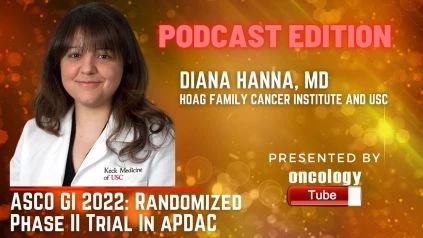Diana Hanna, MD is the Program Director over Hoag’s Phase 1 Cancer Research within the Hoag Family Cancer Institute. Dr. Hanna completed her medical schooling at the University of California, Davis, as well as her internship and residency. She then completed a fellowship in hematology/oncology at the University of Southern California. Dr. Hanna provides oversight for all of Hoag’s Phase 1, or early therapeutic, clinical trials. In this video, she speaks about the ASCO GI 2022 Abstract – Randomized phase II trial of two different nutritional approaches for patients receiving treatment for their advanced pancreatic cancer.
Â
Â
Origins:
Â
Stromal fibrosis, hypoxia, and nutritional deprivation are all symptoms of pancreatic ductal adenocarcinoma (PDAC). PDAC tumors grow quickly, and diagnosis is usually made after cancer has spread. The illness is nevertheless associated with poor results. In patients with metastatic pancreatic cancer, the triplet chemotherapy combination of gemcitabine, nab-paclitaxel, and cisplatin was associated with a median overall survival of 16.4 months in the first-line context (Jameson et al., 2020). Nutritional and metabolic therapies have the potential to alter the tumor microenvironment and enhance patient outcomes. A ketogenic diet, which consists of a low-carbohydrate, low-protein, and high-fat diet, has been shown to reduce glucose and insulin levels while increasing metabolically active ketone bodies in patients with a variety of solid tumors (Weber et al, 2020). A ketogenic diet combined with triplet chemotherapy has recently been proven to prevent the growth of mouse pancreatic KPC tumors and greatly extend animal survival when compared to chemotherapy alone. Glucose depletion changed TCA substrate utilization, and increased NADH levels were all linked to tumor growth inhibition.
Â
Methodologies:
Â
In this Phase II randomized clinical trial (NCT04631445), we compare a medically supervised ketogenic diet (MSKD) to a regular diet in patients with treatment-naive advanced pancreatic cancer who are receiving triplet therapy. The primary endpoint for triplet therapy while on MSKD or non-MSKD is progression-free survival. Disease control rate (PR+ CR+ SD for at least 9 weeks), change in CA 19-9 (or CA125, or CEA if not CA 19-9 expressers), average insulin levels, HbA1c, body weight, comparison of gut microbial diversity, changes in serum metabolites, and quality of life via the EORTC QLQ-C30 assessment are all secondary endpoints. Unlike previous ketogenic intervention studies, the MSKD is backed by Virta Health Corp’s continuous care nutrition intervention, which includes daily ketone and glucose level tracking, a web-based software application, education, and communication with a remote care team to ensure nutritional ketosis is maintained. A total of 40 patients with untreated metastatic PDAC will be enrolled, with 20 individuals assigned to each of the two arms. The trial will begin accepting participants in November 2020. NCT04631445 is the number for the clinical trial.

